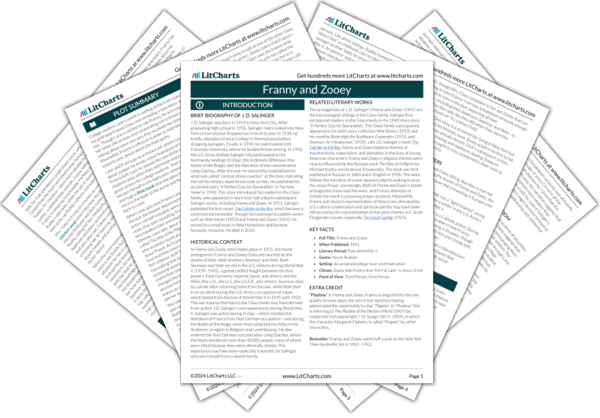In Franny and Zooey, religion is presented as a legitimate source of meaning and a tool for spiritual inquiry. By contrast, psychoanalysis is presented as something that ultimately risks reducing meaningful human suffering to a mere set of symptoms. By examining both religion and psychoanalysis, the narrative explores the approaches available to people experiencing existential angst or uncertainty in the modern world, ultimately hinting that religion is perhaps better able to navigate deep spiritual problems than psychoanalysis.
The wisdom of religion and the comparative uselessness of psychoanalysis is clearest in the narrative in the “breakdown” of sensitive college student Franny Glass. Franny breaks down because she is horrified by the conformity, selfishness, greed, and egotism that she perceives in herself and everyone around her. In other words, the poor moral state of post-World War II U.S. society is what causes her extreme emotional distress. For the most part, the people around her believe she is merely neurotic or obsessive and needs psychoanalysis. But the narrative hints that these people misunderstand the nature of her problem: for example, when Franny’s self-satisfied boyfriend Lane Coutell suggests that she is simply anxious about social competition, he is clearly just applying a fashionable psychoanalytic lens to all human problems rather than thinking through the specifics of Franny’s distress. Franny’s brother Zooey, on the other hand, helps resolve her distress by taking Franny’s breakdown seriously and ultimately convincing her to see the image of Jesus Christ in all the egotists and “phonies” who so depress her. Given that this approach seems to work for Franny, the narrative suggests that religious frameworks perhaps contain more wisdom than modern readers might give them credit for, even if Salinger’s contemporaries (and future readers) might be more inclined to look to psychoanalysis as a way of addressing such existential dilemmas.
Religion vs. Psychoanalysis ThemeTracker

Religion vs. Psychoanalysis Quotes in Franny and Zooey
“I think the emphasis I put on why he was so neurotically attracted to the mot juste wasn’t too bad. I mean in light of what we know today. Not just psychoanalysis and all that crap, but certainly to a certain extent.”
After a moment, she picked up the book, raised it chest-high, and pressed it to her—firmly, and quite briefly. Then she put it back into the handbag, stood up, and came out of the enclosure.
“And the worst part is, if you go bohemian or something crazy like that, you’re conforming just as much as everybody else, only in a different way.”
“I’m not afraid to compete. It’s just the opposite. Don’t you see that? I’m afraid I will compete—that’s what scares me. That’s why I quit the Theatre Department. Just because I’m so horribly conditioned to accept everybody else’s values, and just because I like applause and people to rave about me, doesn’t make it right.”
“But the thing is, the marvellous thing is, when you first start doing it, you don’t even have to have faith in what you’re doing. I mean even if you’re terribly embarrassed about the whole thing, it’s perfectly all right. I mean you’re not insulting anybody or anything. In other words, no one asks you to believe a single thing when you first start out.”
“All that stuff . . . I don’t think you leave any margin for the most elementary psychology. I mean I think all those religious experiences have a very obvious psychological background—you know what I mean . . . It’s interesting, though.”
I know the difference between a mystical story and a love story. I say that my current offering isn’t a mystical story, or a religiously mystifying story, at all. I say it’s a compound, or multiple, love story, pure and complicated.
I can’t help thinking that you’d make a damn site better-adjusted actor if Seymour and I hadn’t thrown in the Upanishads and the Diamond Sutra and Eckhart and all our other old loves with the rest of your recommended home reading when you were small.
Seymour once said to me—in a crosstown bus, of all places—that all legitimate religious study must lead to unlearning the differences, the illusory differences, between boys and girls, animals and stones, day and night, heat and cold.
“You can’t live in the world with such strong likes and dislikes[.]”
“Those two bastards got us nice and early and made us into freaks with freakish standards, that’s all. We’re the Tattooed Lady, and we’re never going to have a minute’s peace, the rest of our lives, till everybody else is tattooed too.”
“You want your Emily, every time she has the urge to write a poem, to just sit down and say a prayer till her nasty, egotistical urge goes away? No, of course you don’t!”
“You don’t even have enough sense to drink when somebody brings you a cup of consecrated chicken soup—which is the only kind of chicken soup Bessie ever brings to anybody around this madhouse.”
“There isn’t anyone out there who isn’t Seymour’s Fat Lady. […] And don’t you know—listen to me, now—don’t you know who that Fat Lady really is? . . . Ah, buddy. Ah, buddy. It’s Christ Himself.”











